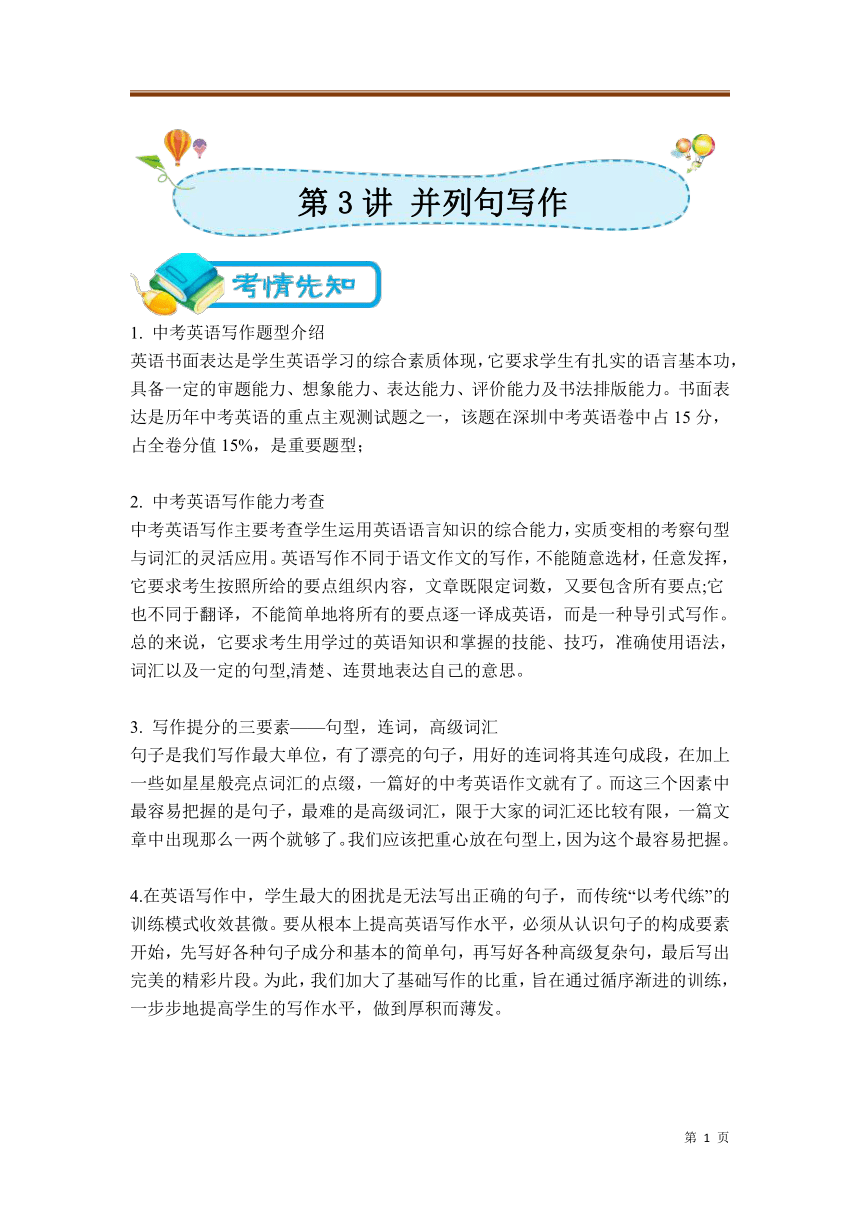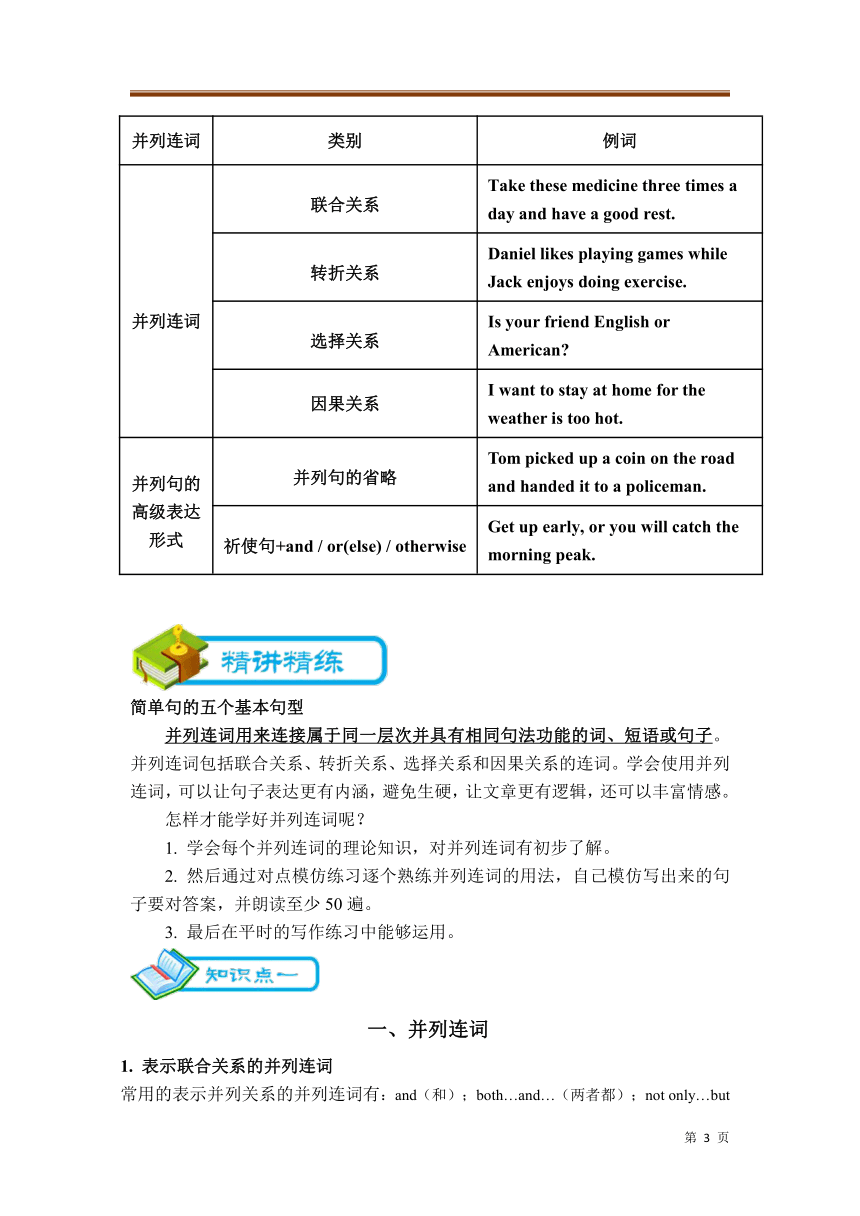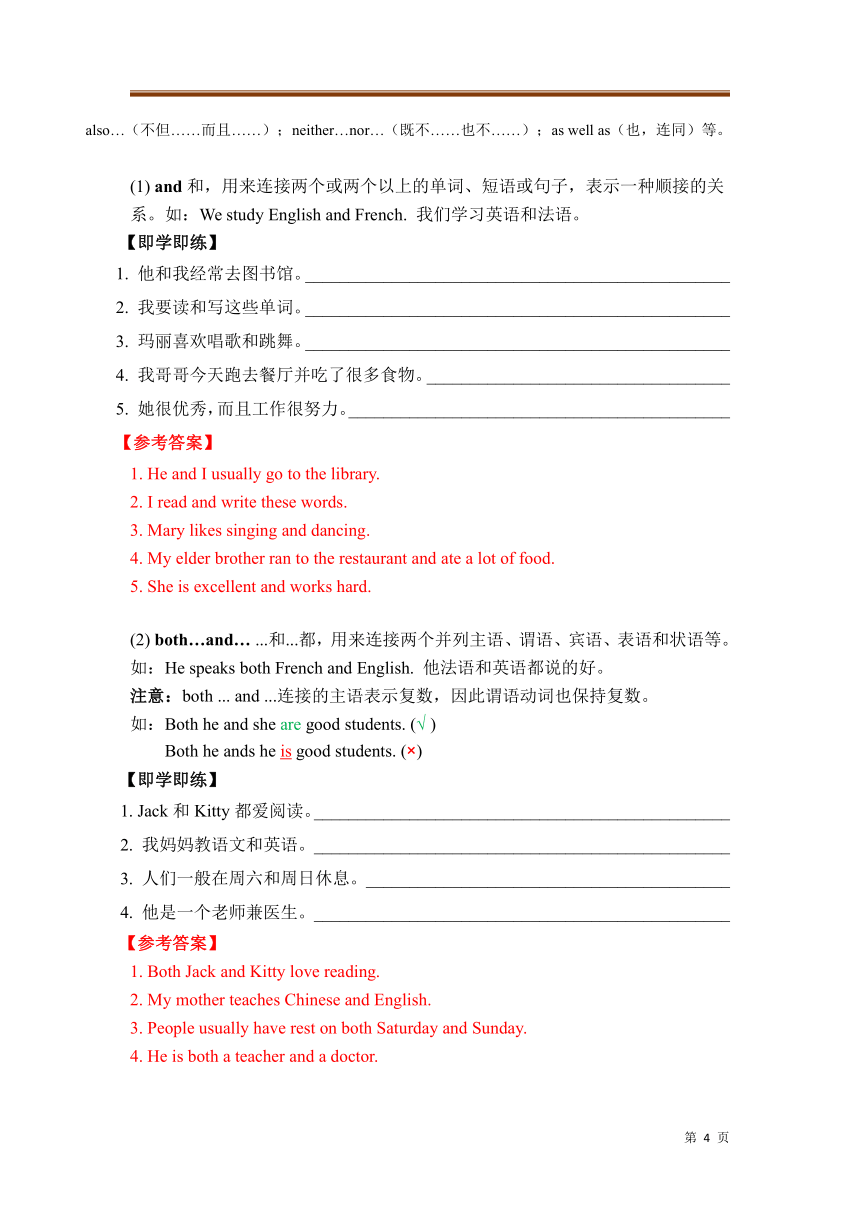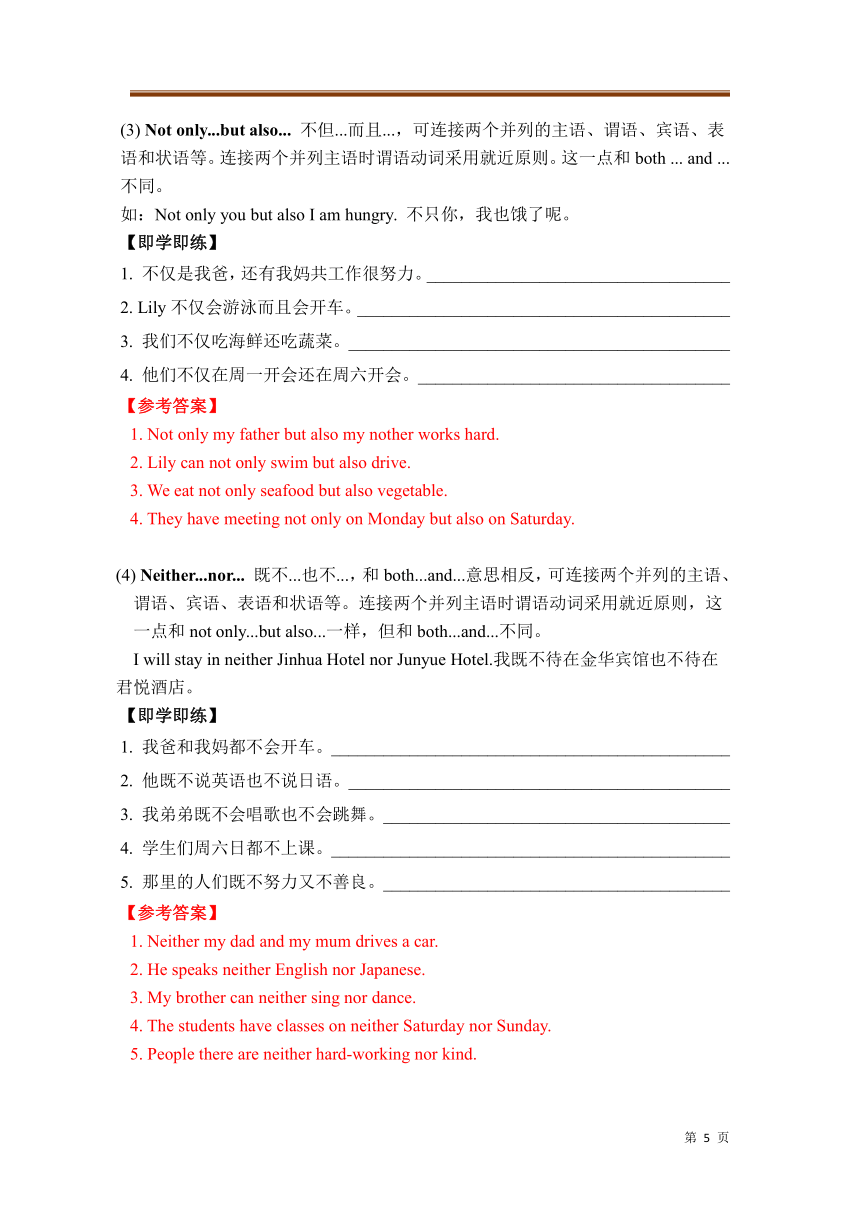2021年深圳沪教版初三英语专题第3讲:并列句写作讲义 教师版
文档属性
| 名称 | 2021年深圳沪教版初三英语专题第3讲:并列句写作讲义 教师版 |

|
|
| 格式 | zip | ||
| 文件大小 | 306.4KB | ||
| 资源类型 | 教案 | ||
| 版本资源 | 牛津深圳版 | ||
| 科目 | 英语 | ||
| 更新时间 | 2021-05-16 00:00:00 | ||
图片预览





文档简介
中考英语写作题型介绍
英语书面表达是学生英语学习的综合素质体现,它要求学生有扎实的语言基本功,具备一定的审题能力、想象能力、表达能力、评价能力及书法排版能力。书面表达是历年中考英语的重点主观测试题之一,该题在深圳中考英语卷中占15分,占全卷分值15%,是重要题型;
中考英语写作能力考查
中考英语写作主要考查学生运用英语语言知识的综合能力,实质变相的考察句型与词汇的灵活应用。英语写作不同于语文作文的写作,不能随意选材,任意发挥,它要求考生按照所给的要点组织内容,文章既限定词数,又要包含所有要点;它也不同于翻译,不能简单地将所有的要点逐一译成英语,而是一种导引式写作。总的来说,它要求考生用学过的英语知识和掌握的技能、技巧,准确使用语法,词汇以及一定的句型,清楚、连贯地表达自己的意思。
3.
写作提分的三要素——句型,连词,高级词汇
句子是我们写作最大单位,有了漂亮的句子,用好的连词将其连句成段,在加上一些如星星般亮点词汇的点缀,一篇好的中考英语作文就有了。而这三个因素中最容易把握的是句子,最难的是高级词汇,限于大家的词汇还比较有限,一篇文章中出现那么一两个就够了。我们应该把重心放在句型上,因为这个最容易把握。
4.在英语写作中,学生最大的困扰是无法写出正确的句子,而传统“以考代练”的训练模式收效甚微。要从根本上提高英语写作水平,必须从认识句子的构成要素开始,先写好各种句子成分和基本的简单句,再写好各种高级复杂句,最后写出完美的精彩片段。为此,我们加大了基础写作的比重,旨在通过循序渐进的训练,一步步地提高学生的写作水平,做到厚积而薄发。
1.
初一阶段主要会学习以下题材的写作:如何用英文写通知,如何写应用文体,
记叙文,如何写人物生平介绍。练习写介绍景物的应用文,描写最喜爱的运动员,说明文,写便条,写E-mail寻求建议等;题型涉及看图写作文,看图表写作文,话题作文,命题作文等。字数要求在80左右;
2.
初二阶段主要会学习以下题材的写作:议论文,说明文--如何解决某个文体,练习描写某个地点的短文,练习描写某个人的短文,写海报,对现象进行归纳总结和反思等。题型涉及情景作文,看图表写作文,话题作文,命题作文等。字数要求在80-100左右;
3.
初三阶段主要会学习以下题材的写作:关于描述景点的说明文,建议信,给笔友写信,求职信,通知(口头通知和书面通知),议论文,演讲稿,用记叙文叙述故事,写E-mail等。题型涉及情景作文,话题作文等。字数要求在80-100词左右。
并列连词
类别
例词
并列连词
联合关系
Take
these
medicine
three
times
a
day
and
have
a
good
rest.
转折关系
Daniel
likes
playing
games
while
Jack
enjoys
doing
exercise.
选择关系
Is
your
friend
English
or
American?
因果关系
I
want
to
stay
at
home
for
the
weather
is
too
hot.
并列句的高级表达形式
并列句的省略
Tom
picked
up
a
coin
on
the
road
and
handed
it
to
a
policeman.
祈使句+and
/
or(else)
/
otherwise
Get
up
early,
or
you
will
catch
the
morning
peak.
简单句的五个基本句型
并列连词用来连接属于同一层次并具有相同句法功能的词、短语或句子。并列连词包括联合关系、转折关系、选择关系和因果关系的连词。学会使用并列连词,可以让句子表达更有内涵,避免生硬,让文章更有逻辑,还可以丰富情感。
怎样才能学好并列连词呢?
1.
学会每个并列连词的理论知识,对并列连词有初步了解。
2.
然后通过对点模仿练习逐个熟练并列连词的用法,自己模仿写出来的句子要对答案,并朗读至少50遍。
3.
最后在平时的写作练习中能够运用。
一、并列连词
1.
表示联合关系的并列连词
常用的表示并列关系的并列连词有:and(和);both…and…(两者都);not
only…but
also…(不但……而且……);neither…nor…(既不……也不……);as
well
as(也,连同)等。
(1)
and和,用来连接两个或两个以上的单词、短语或句子,表示一种顺接的关系。如:We
study
English
and
French.
我们学习英语和法语。
【即学即练】
1.
他和我经常去图书馆。_________________________________________________
2.
我要读和写这些单词。_________________________________________________
3.
玛丽喜欢唱歌和跳舞。_________________________________________________
4.
我哥哥今天跑去餐厅并吃了很多食物。___________________________________
5.
她很优秀,而且工作很努力。____________________________________________【参考答案】
1.
He
and
I
usually
go
to
the
library.
2.
I
read
and
write
these
words.
3.
Mary
likes
singing
and
dancing.
4.
My
elder
brother
ran
to
the
restaurant
and
ate
a
lot
of
food.
5.
She
is
excellent
and
works
hard.
(2)
both…and…
...和...都,用来连接两个并列主语、谓语、宾语、表语和状语等。
如:He
speaks
both
French
and
English.
他法语和英语都说的好。
注意:both
...
and
...连接的主语表示复数,因此谓语动词也保持复数。
如:Both
he
and
she
are
good
students.
(√
)
Both
he
ands
he
is
good
students.
(×)
【即学即练】
1.
Jack和Kitty都爱阅读。________________________________________________
2.
我妈妈教语文和英语。________________________________________________
3.
人们一般在周六和周日休息。__________________________________________
4.
他是一个老师兼医生。________________________________________________
【参考答案】
1.
Both
Jack
and
Kitty
love
reading.
2.
My
mother
teaches
Chinese
and
English.
3.
People
usually
have
rest
on
both
Saturday
and
Sunday.
4.
He
is
both
a
teacher
and
a
doctor.
(3)
Not
only...but
also...
不但...而且...,可连接两个并列的主语、谓语、宾语、表语和状语等。连接两个并列主语时谓语动词采用就近原则。这一点和both
...
and
...不同。
如:Not
only
you
but
also
I
am
hungry.
不只你,我也饿了呢。
【即学即练】
1.
不仅是我爸,还有我妈共工作很努力。___________________________________
2.
Lily不仅会游泳而且会开车。___________________________________________
3.
我们不仅吃海鲜还吃蔬菜。____________________________________________
4.
他们不仅在周一开会还在周六开会。____________________________________
【参考答案】
1.
Not
only
my
father
but
also
my
nother
works
hard.
2.
Lily
can
not
only
swim
but
also
drive.
3.
We
eat
not
only
seafood
but
also
vegetable.
4.
They
have
meeting
not
only
on
Monday
but
also
on
Saturday.
(4)
Neither...nor...
既不...也不...,和both...and...意思相反,可连接两个并列的主语、谓语、宾语、表语和状语等。连接两个并列主语时谓语动词采用就近原则,这一点和not
only...but
also...一样,但和both...and...不同。
I
will
stay
in
neither
Jinhua
Hotel
nor
Junyue
Hotel.我既不待在金华宾馆也不待在君悦酒店。
【即学即练】
1.
我爸和我妈都不会开车。______________________________________________
2.
他既不说英语也不说日语。____________________________________________
3.
我弟弟既不会唱歌也不会跳舞。________________________________________
4.
学生们周六日都不上课。______________________________________________
5.
那里的人们既不努力又不善良。________________________________________
【参考答案】
1.
Neither
my
dad
and
my
mum
drives
a
car.
2.
He
speaks
neither
English
nor
Japanese.
3.
My
brother
can
neither
sing
nor
dance.
4.
The
students
have
classes
on
neither
Saturday
nor
Sunday.
5.
People
there
are
neither
hard-working
nor
kind.
(5)
as
well
as
也,连同。常用于连接两个并列成分,作“也,还”解。它强调的是前一项,后一项顺便提及。因此连接并列主语时,谓语动词与前一项一致。这一点和not
only...but
also...,
both...and...,
neither...nor...相反。
如:Your
wife
as
well
as
you
is
friendly
to
me.
你妻子和你对我都很友善。
【即学即练】
1.
老师连同学生在打篮球。_____________________________________________
2.
昨天我爸连同我妈跟我视频聊天(video
chat)。_____________________________
3.
一个老人连同一个小孩在街上乞讨(beg)。________________________________
4.
我想见你和你的朋友。________________________________
【参考答案】
1.The
teacher
as
well
as
the
students
is
playing
basketball.
2.
My
father
as
well
as
my
mum
had
a
video
chat
with
me
yesterday.
3.
An
old
man
as
well
as
a
child
is
begging
on
the
street.
4.
I
want
to
see
you
as
well
as
you
friends.
2.
表示转折关系的并列连词
常见的表转折关系的并列连词有but(但是)、however(然而),yet(然而,仍然)、still(仍然)、while(然而)、although/thoug/even
though(尽管)等。
(1)
but但是,常用于口语中,语气较弱,泛指与前述情况相反。
如:He
has
three
daughters
but
no
sons.
他有3个女儿,但没有儿子。
【即学即练】
1.
昨天他起床很晚但是上学没有迟到。_____________________________________
2.
我喜欢打篮球但不喜欢看篮球比赛。_____________________________________
3.
一些人睡了很多但还是很困。___________________________________________
【参考答案】
1.
He
got
up
late
but
he
wasn’t
late
for
shcool.
2.
I
like
playing
basketball
but
I
don’t
like
watching
basketball
games.
3.
Some
people
sleep
a
lot
but
still
tired.
(2)
however然而,语气稍弱于but,连接性也较弱,因而常作插入语。常用于两个句子之间,且有逗号隔开。
如:Later,
however,
he
changed
his
mind.
然后他后来改变了主意。
【即学即练】
1.
我喜欢他,然而他不喜欢我。__________________________________________
2.
大家都努力工作,然而它并没有成功。___________________________________
3.
人们总是希望能够过得开心,然而现实(reality)并不是这样。______________________________________________________________________
【参考答案】
1.
I
like
him,
however,
he
doesn’t
like
me.
2.
Everyone
all
works
hard,
however,
it
doesn’t
work.
3.
People
alwasys
wish
to
be
happy,
however,
the
reality
is
not
like
this.
(3)
yet然而,仍然,尚且。常用于疑问句和否定句中。
如:He
studied
hard
yet
he
failed.
学习很努力但然而还是失败了。
【即学即练】
1.
我在你面前你却不知道我多爱你。___________________________________
2.
他还没到这里。_____________________________________________________
3.
一切都准备好了吗?__________________________________________________
4.
我还没有完成作业。__________________________________________________
【参考答案】
1.
I
am
standing
in
front
of
you
yet
you
don’t
know
how
much
I
love
you.
2.
He
is
not
here
yet.
3.
Is
everything
ready
yet?
4.
I
haven’t
finished
the
homework
yet.
(4)
still仍然,still多用于肯定句或疑问句。指不管做出多大努力或让步,仍达不到预期的结果。
如:He
worked
hard,
still,
he
failed.
他工作很努力,然而他失败了。
【即学即练】
1.
他仍然和他的妈妈生活。_____________________________________
2.
这个小男孩弄坏了我的自行车,他还笑。_______________________________
3.
生活很艰难,而我们仍然需要去生活。__________________________________
【参考答案】
1.
He
still
lives
with
her
mother.
2.
The
little
boy
broke
my
bike
and
he
still
laughed.
3.
Life
is
hard,
and
we
still
need
to
live.
(5)
while但是,表对照关系,用于同类事情不同结果的对比,连接两个句子。
如:My
father
likes
watching
football
programme
while
my
mother
likes
watching
teleplay.
我爸喜欢看足球节目而我妈喜欢看电视剧。
【即学即练】
1.
他们在酒店吃晚饭而老人独自在家吃。____________________________
2.
别人在学习他却在睡觉。______________________________________________
3.
别人周末休息而我们周末上班。_________________________________________
【参考答案】
1.
They
had
dinner
in
a
hotel
while
the
old
man
had
it
at
home
alone.
2.
The
others
are
studying
while
she
is
sleeping.
3.
The
others
have
rest
at
weekends
while
we
work
at
that
time.
(6)
although/though/even
though尽管,虽然。一般情况下三者可互相换用。但although比较正式,多用于书面语,且多放于句首。though和even
though习惯放在句中,在although,
though和even
though引导的让步状语从句中,主句不能用but,但可使用yet或still。
如:Though
/
Although
they’re
expensive,
people
buy
them.
虽然它们很昂贵,人们还是买。
【即学即练】
1.
虽然他不聪明但是他很努力。__________________________________________
2.
工人们还是要继续在户外工作,尽管今天天气很热。________________________
3.
他经常帮我尽管他很忙。______________________________________________
4.
尽管这本书很旧,但他仍然决定要买它。________________________________
【参考答案】
1.
Although/though
he
is
smart,
but
he
works
hard.
2.
The
workers
works
outside
though/even
though
the
weather
is
so
hot
today.
3.
He
often
helps
me
thoug/even
though
he
is
busy.
4.
Although/Though
the
book
is
very
old,
he
still
decided
to
buy
it.
3.
表示因果关系的并列连词
常见的表因果关系的并列连词有because
(因为),
becasue
of
(因为),
so
(所以),
for
(因为),
since
(既然,鉴于,因为),
therefore
(因此)等。
(1)
because/because
of因为,用于解释说明事情发生的原因。后面接句子。而because
of也表示“因为”,但后面接名词或名词短语。
如:He
forgot
his
daughter’s
birthday
because
he
was
so
busy.
他忘记了他女儿的生日因为他太忙了。
或者这样表达:He
forgot
his
daughter’s
birthday
because
of
his
business.
他忘记了他女儿的生日因为他的工作。
【即学即练】
1.
他没去学校因为他生病了。____________________________________________
2.
我迟到了因为我错过了第一辆公交车。___________________________________
3.
他昨天没去上班因为暴风雨。_________________________________________
【参考答案】
1.
He
didn’t
go
to
shcool
because
he
was
ill.
2.
I
was
late
because
I
missed
the
first
bus.
3.
He
didn’t
go
to
work
because
of
the
storm
yesterday.
(2)
so所以,用于引导结果。
如:The
door
was
locked,
so
we
couldn’t
get
in.
这个门口被锁上了,所以我们进不去。
【即学即练】
1.
我今天生病了,所以没去学校。__________________________________________
2.
我刚刚在上课,所以没回你消息。______________________________________
3.
我觉得你的公司很有潜力,所以我来了。________________________________
【参考答案】
1.
I
was
ill
today
today,
so
I
didn’t
go
to
shcool.
2.
I
was
in
class
just
now,
so
I
didn’t
text/reply
you.
3.
I
think
your
company
is
potential,
so
I
come.
(3)
for因为,for用作连词,主要表示理由,引起的分句对前面的话进行解释,常用逗号把它和前面的分句隔开。
如:She
was
angry,
for
she
didn’t
know
French.
她生气了,因为她不懂法语。
【即学即练】
1.
一定是下过雨了,因为地面还是湿的。____________________________________
2.
请原谅(原谅)他,因为他才10岁。______________________________________
3.
我要找他,因为我有事要告诉他。________________________________
【参考答案】
1.
It
must
be
rainny
just
now,
because
the
ground
is
wet.
2.
Please
forgive
him,
for
he
is
only
10
years
old.
3.
I
want
to
find
him,
because
I
have
something
to
tell
him.
(4)
since因为,既然。相当于now
that,表示对方已知的无需加以说明的原因或事实,语气比because弱,但比for强,它引导的从句通常放在主句之前,有时也放在主句之后。
如:Since
you
are
wrong,
you
should
apologize.
既然你错了,你应该道歉。
【即学即练】
1.
既然你完成工作,让我们去公园吧。____________________________________
2.
既然我们还很年轻,我们就不应该害怕犯错。______________________________
3.
既然雨已经停了,那我们就出发吧。________________________________
4.
既然它已经没法改变了,为什么不接受它呢?____________________________
【参考答案】
1.
Since
you
have
finished
the
work,
let’s
go
to
park.
2.
Since
we
are
young,
we
shouldn’t
be
afraid
of
making
mistakes.
3.
Since
the
rain
has
stpopped,
let’s
go.
4.
Since
you
can’t
change
it,
why
not
accept
it?
(5)
therefore因此,表示结果。有两种用法。
1.
单独使用,①放在句首;②用作副词;③用作插入语
如:Therefore,
you
must
learn
English
well.
因此,有必须学好英语。
They
therefore
can
learn
English
well.
他们因此能学好英语。
Many
fast
food
restaurants,
therefore,
have
red
furniture
and
walls.
很多快餐馆,因此,有红色的家具和墙。
2.
用在表示结果的分句中,一个句中有原因也有结果,它用在表示结果的句中。
如:I
have
a
headache,
therefore
I
conldn’t
go
to
your
party.
我头很疼,因此不能去参加你的聚会了。
【即学即练】
1.
我生病了,因此不能来。____________________________________
2.
这些花很漂亮,因此被很多人喜欢。______________________________
3.
因此,你一定要学会学习。________________________________
【参考答案】
1.
I
am
ill,
therefore
I
couldn’t
go
to
your
party.
2.
These
flowers
are
very
beautiful
and
therefore
liked
by
many
people.
3.
Therefore,
you
must
learn
to
study.
4.
表示选择关系的并列连词
常用的表示选择关系的连词有or(或者,否则),otherwise(否则),either...or...(不是...就是...,要么...要么...)等。
(1)
or或者,用于两者之中选择一个。
如:Is
your
friend
English
or
American?
你的朋友是英国人还是美国人?
祈使句后的or,有转折的意思,意为“否则……”。
如:Study
hard,
or
you
will
fail
the
exam.
努力学习,否则你将考试失败。
注意:当列举成分是主语且又在否定词之前时,用and;
当列举成分在否定词之后时,用or。
如:Lucy
and
Lily
can’t
speak
Chinese.
露西和莉莉都不会说汉语。
I
can’t
speak
English
or
Japanese.
我不会说英语和日语。
【即学即练】
1.
你来了没有?____________________________________
2.
有大概7或8个人在我们前面。______________________________
3.
快点,否则你将迟到学校了。________________________________
4.
我对数学和英语不感兴趣。________________________________
【参考答案】
1.
Are
you
coming
or
not?
2.
There
are
7
or
8
people
in
front
of
us.
3.
Hurry
up,
or
you
will
be
late
for
school.
4.
I
am
not
interested
in
English
or
Maths.
(2)
otherwise否则,不然。相当于or/or
esle,一般用于句首,后面有逗号。
如:I
have
to
go.
Otherwise,
I
will
be
late
for
the
meeting.
我得走了,不然我要迟到开会了。
如:Study
hard,
or
you
will
fail
the
exam.
努力学习,否则你将考试失败。
【即学即练】
1.
我们得去早点,要不然就没有座位了。____________________________________
2.
抓住(seize)机会,否则你将会后悔。_____________________________________
3.
我不知道你当时在那里,否则我就去找你了。______________________________
【参考答案】
1.
We
should
go
early,
otherwise
we
may
not
get
a
seat.
2.
Seize
the
chance,
otherwise
you
will
regret
it.
3.
I
didn’t
know
where
were
you,
otherwise
I
would
come
to
you.
(3)
either...or...
要么...要么...,
不是...就是...。可连接两个并列的主语、谓语、宾语、表语和状语等。连接两个并列主语时谓语动词采用就近原则。
如:Either
my
father
or
my
younger
brother
is
coming.
不是我爸来就是我弟来。
【即学即练】
1.
他要么是疯了(mad)要么是喝醉了。____________________________________
2.
不是你就是他是错误的。_____________________________________
3.
我们老板不是住在这个宾馆就是住在那个酒店。___________________________
【参考答案】
1.
He
is
either
mad
or
drunk.
2.
Either
you
or
him
is
wrong.
3.
Our
boss
lives
etiher
in
this
hotel
ot
that
one.
二、并列句的高级表达式
1.并列句的省略
当句中出现两个分句时,为了简便,我们常常省略一些重复出现的内容但也能达到想要的表达效果。
(1)省略主语
在并列句中,如果如何前后两个简单句的主语相同,通常可以省略后面一个简单句的主语。
如:Jack
reallized
his
mistakes
and
(he)
apologized
at
once.
杰克意识到了他的错误并马上道歉。
【即学即练】
1.
他从树上掉下来但是没有受伤。_______________________________________
2.
她卖了她的房子,但她禁不住后悔(regret)。_______________________________
3.
警察找到了他并罚(fine)他钱。________________________________________
【参考答案】
1.
He
fell
down
off
the
tree
and
wasn’t
hurt.
2.
She
sold
her
house
but
can’t
help
to
regret.
3.
The
policemem
found
him
and
fined
him.
(2)
省略谓语
在并列句中,如果如何前后两个简单句的谓语相同,通常可以省略后面一个简单句的谓语。
如:I’d
love
to
come
but
I
can’t
(come).
我很想来但是我不能来。
【即学即练】
1.
Peter通过了考试,但是Bill没有。_______________________________________
2.
她说她要打电话给我,但是她没有。___________________________________
3.
这个价格只包括早餐吗,还是晚餐也包括?_____________________________
4.
这个宾馆很便宜但很干净。____________________________________________
【参考答案】
1.
Peter
passed
the
exam,
but
Bill
didn’t.
2.
She
said
she
would
call
me,
yet
she
hadn’t.
3.
Does
the
price
include
breakfast,
or
dinner
as
well?
4.
The
hotel
is
very
cheap
but
clean.
2.祈使句+and
/
or(else)
/
otherwise
(1)
表示递进关系。在祈使句中,我们一般用and/then表示递进关系。表示“那么”
如:Stand
over
there
and
you
will
be
able
to
see
it
better.
站在那边你会看得更清楚。
Finish
the
homewor
then
I
will
tell
you
the
answer.
完成作业我会告诉你答案。
【即学即练】
1.
仔细考虑你将找打答案。______________________________________________
2.
努力工作你将每天进步。______________________________________________
3.
再给我3分钟,我将完成这项工作。______________________________________
4.
认真做笔记,然后你将学得更好。__________________________________
【参考答案】
1.
Think
it
over
and
you
will
find
the
answer.
2.
Work
hard
and
you
will
make
progress
every
day.
3.
Give
me
another
3
minutes
and
I
will
finish
the
job.
4.
Take
notes
carfully
and
then
you
will
learn
better.
(2)
表示转折关系。在祈使句中,我们一般用or/or
else/otherwise表示转折关系。表示“否则”。
如:Hurry
up,
or
you
will
be
late.
赶快,不然你会迟到。
【即学即练】
1.
你来之前请给我们打个电话,否则我们可能会出去。___________________________________________________________________
2.
请保护野生动物,否则它们有一天会灭亡。______________________________
3.
下次准时(准时)到这里,否则你将会被惩罚。______________________________
4.
调小热量,否则披萨会烧焦。________________________________________
【参考答案】
1.
Please
call
us
before
you
come,
or/otherwisewe
may
get
out.
2.
Please
protect
the
wild
animals,
or/otherwise
they
will
die
out
some
day.
3.
Arrive
here
on
time,
or/otherwise
you
will
be
punished.
4.
Turn
the
heat
down,
or/otherwise
the
piza
will
burn.
一.请判断下列句子是表示哪种关系的并列句。
1.Not
only
the
teachers
but
also
the
students
are
there.
(
)
2.He
was
doing
homework
while
the
cat
was
sleeping.
(
)
3.Since
you’ve
win
the
game,
I
should
give
you
five!
(
)
4.The
rich
man
travels
to
either
New
Zealand
or
Malaysia.
(
)
二、分析句子,看看下列句子省略了什么成分。
1.
The
boy
visited
his
grandparents
and
had
a
good
time
with
them.
(
)
2.
Many
people
want
to
take
a
trip
but
they
don’t.
(
)
3.
He
often
go
fishing
as
well
as
swimming.
(
)
4.
It’s
more
healthy
to
eat
vegetable
than
fast
food.
(
)
三、用and,
then,
or,
otherwise填空。
1.
Find
ways
to
get
on
well
with
your
classmates,
______
you
will
get
yourself
very
lonely.
2.
Send
me
an
e-mail
before
you
come.
I'll
meet
you
at
the
airport.
3.
Get
up
now.
you’ll
late
for
the
bus.
4.
Work
hard
first,
you
will
have
what
you
want.
四.翻译。
1.
尽管他生病了但他还是坚持工作。
________________________________________________________________
2.
给我一个机会,我将向你证明(prove)它。
_________________________________________________________________
3.
尽管她才7岁,但她会做饭。
_________________________________________________________________
4.
我不喜欢鸡肉和鱼肉。
________________________________________________________________
5.
Linda努力成为一名优秀的老师,而且她成功了。
________________________________________________________________
6.
我爸和我妈都很喜欢这家餐厅。
________________________________________________________________
7.
他不仅善良而且工作努力。
________________________________________________________________
8.
我朋友英语说得很好因为他平时经常说英语。
________________________________________________________________
9.
很多年轻人既不喜欢运动也不喜欢和别人交流。
________________________________________________________________
10.
吃完这些食物,不然在路上你会饿。
________________________________________________________________
【参考答案】
一、请判断下列句子是表示哪种关系的并列句。
1.联合关系
2.转折关系
3.因果关系
4.选择关系
二、分析句子,看看下列句子省略了什么成分。
1.
省略主语
2.
省略谓语
3.
省略主语和谓语
4.
省略主语和谓语
三、用and,
then,
or,
otherwise填空。
1.
or/otherwise
2.
And
3.
Otherwise
4.
then
四、翻译。
1.
He
is
ill
but
he
still
works.
2.
GIve
me
a
chance,
I
will
prove
it
to
you.
3.
Although
she
is
only
7,
but
she
can
cook.
4.
I
don’t
like
chiken
or
fish.
5.
Linda
tried
to
becaome
an
excellent
teacher
and
she
did.
6.
Both
my
dad
and
my
mum
like
this
restaurant.
7.
He
is
not
only
kind
but
also
hard-working.
8.
My
friend
speaks
English
very
well
because
he
often
speaks
it.
9.
Many
young
man
like
neither
doing
sports
nor
communicating
with
others.
10.
Finish
eating
these
food,
or
you
will
be
hungry
on
the
way.
并列连词
类别
例词
并列连词
联合关系
Take
these
medicine
three
times
a
day
and
have
a
good
rest.
转折关系
Daniel
likes
playing
games
while
Jack
enjoys
doing
exercise.
选择关系
Is
your
friend
English
or
American?
因果关系
I
want
to
stay
at
home
for
the
weather
is
too
hot.
并列句的高级表达形式
并列句的省略
Tom
picked
up
a
coin
on
the
road
and
handed
it
to
a
policeman.
祈使句+and
/
or(else)
/
otherwise
Get
up
early,
or
you
will
catch
the
morning
peak.
学生易错点整理:
_________________________________________________________________________________________________________________________________________________________________________________________________________________________________________________________________________________________________________________________________________________________
英语书面表达是学生英语学习的综合素质体现,它要求学生有扎实的语言基本功,具备一定的审题能力、想象能力、表达能力、评价能力及书法排版能力。书面表达是历年中考英语的重点主观测试题之一,该题在深圳中考英语卷中占15分,占全卷分值15%,是重要题型;
中考英语写作能力考查
中考英语写作主要考查学生运用英语语言知识的综合能力,实质变相的考察句型与词汇的灵活应用。英语写作不同于语文作文的写作,不能随意选材,任意发挥,它要求考生按照所给的要点组织内容,文章既限定词数,又要包含所有要点;它也不同于翻译,不能简单地将所有的要点逐一译成英语,而是一种导引式写作。总的来说,它要求考生用学过的英语知识和掌握的技能、技巧,准确使用语法,词汇以及一定的句型,清楚、连贯地表达自己的意思。
3.
写作提分的三要素——句型,连词,高级词汇
句子是我们写作最大单位,有了漂亮的句子,用好的连词将其连句成段,在加上一些如星星般亮点词汇的点缀,一篇好的中考英语作文就有了。而这三个因素中最容易把握的是句子,最难的是高级词汇,限于大家的词汇还比较有限,一篇文章中出现那么一两个就够了。我们应该把重心放在句型上,因为这个最容易把握。
4.在英语写作中,学生最大的困扰是无法写出正确的句子,而传统“以考代练”的训练模式收效甚微。要从根本上提高英语写作水平,必须从认识句子的构成要素开始,先写好各种句子成分和基本的简单句,再写好各种高级复杂句,最后写出完美的精彩片段。为此,我们加大了基础写作的比重,旨在通过循序渐进的训练,一步步地提高学生的写作水平,做到厚积而薄发。
1.
初一阶段主要会学习以下题材的写作:如何用英文写通知,如何写应用文体,
记叙文,如何写人物生平介绍。练习写介绍景物的应用文,描写最喜爱的运动员,说明文,写便条,写E-mail寻求建议等;题型涉及看图写作文,看图表写作文,话题作文,命题作文等。字数要求在80左右;
2.
初二阶段主要会学习以下题材的写作:议论文,说明文--如何解决某个文体,练习描写某个地点的短文,练习描写某个人的短文,写海报,对现象进行归纳总结和反思等。题型涉及情景作文,看图表写作文,话题作文,命题作文等。字数要求在80-100左右;
3.
初三阶段主要会学习以下题材的写作:关于描述景点的说明文,建议信,给笔友写信,求职信,通知(口头通知和书面通知),议论文,演讲稿,用记叙文叙述故事,写E-mail等。题型涉及情景作文,话题作文等。字数要求在80-100词左右。
并列连词
类别
例词
并列连词
联合关系
Take
these
medicine
three
times
a
day
and
have
a
good
rest.
转折关系
Daniel
likes
playing
games
while
Jack
enjoys
doing
exercise.
选择关系
Is
your
friend
English
or
American?
因果关系
I
want
to
stay
at
home
for
the
weather
is
too
hot.
并列句的高级表达形式
并列句的省略
Tom
picked
up
a
coin
on
the
road
and
handed
it
to
a
policeman.
祈使句+and
/
or(else)
/
otherwise
Get
up
early,
or
you
will
catch
the
morning
peak.
简单句的五个基本句型
并列连词用来连接属于同一层次并具有相同句法功能的词、短语或句子。并列连词包括联合关系、转折关系、选择关系和因果关系的连词。学会使用并列连词,可以让句子表达更有内涵,避免生硬,让文章更有逻辑,还可以丰富情感。
怎样才能学好并列连词呢?
1.
学会每个并列连词的理论知识,对并列连词有初步了解。
2.
然后通过对点模仿练习逐个熟练并列连词的用法,自己模仿写出来的句子要对答案,并朗读至少50遍。
3.
最后在平时的写作练习中能够运用。
一、并列连词
1.
表示联合关系的并列连词
常用的表示并列关系的并列连词有:and(和);both…and…(两者都);not
only…but
also…(不但……而且……);neither…nor…(既不……也不……);as
well
as(也,连同)等。
(1)
and和,用来连接两个或两个以上的单词、短语或句子,表示一种顺接的关系。如:We
study
English
and
French.
我们学习英语和法语。
【即学即练】
1.
他和我经常去图书馆。_________________________________________________
2.
我要读和写这些单词。_________________________________________________
3.
玛丽喜欢唱歌和跳舞。_________________________________________________
4.
我哥哥今天跑去餐厅并吃了很多食物。___________________________________
5.
她很优秀,而且工作很努力。____________________________________________【参考答案】
1.
He
and
I
usually
go
to
the
library.
2.
I
read
and
write
these
words.
3.
Mary
likes
singing
and
dancing.
4.
My
elder
brother
ran
to
the
restaurant
and
ate
a
lot
of
food.
5.
She
is
excellent
and
works
hard.
(2)
both…and…
...和...都,用来连接两个并列主语、谓语、宾语、表语和状语等。
如:He
speaks
both
French
and
English.
他法语和英语都说的好。
注意:both
...
and
...连接的主语表示复数,因此谓语动词也保持复数。
如:Both
he
and
she
are
good
students.
(√
)
Both
he
ands
he
is
good
students.
(×)
【即学即练】
1.
Jack和Kitty都爱阅读。________________________________________________
2.
我妈妈教语文和英语。________________________________________________
3.
人们一般在周六和周日休息。__________________________________________
4.
他是一个老师兼医生。________________________________________________
【参考答案】
1.
Both
Jack
and
Kitty
love
reading.
2.
My
mother
teaches
Chinese
and
English.
3.
People
usually
have
rest
on
both
Saturday
and
Sunday.
4.
He
is
both
a
teacher
and
a
doctor.
(3)
Not
only...but
also...
不但...而且...,可连接两个并列的主语、谓语、宾语、表语和状语等。连接两个并列主语时谓语动词采用就近原则。这一点和both
...
and
...不同。
如:Not
only
you
but
also
I
am
hungry.
不只你,我也饿了呢。
【即学即练】
1.
不仅是我爸,还有我妈共工作很努力。___________________________________
2.
Lily不仅会游泳而且会开车。___________________________________________
3.
我们不仅吃海鲜还吃蔬菜。____________________________________________
4.
他们不仅在周一开会还在周六开会。____________________________________
【参考答案】
1.
Not
only
my
father
but
also
my
nother
works
hard.
2.
Lily
can
not
only
swim
but
also
drive.
3.
We
eat
not
only
seafood
but
also
vegetable.
4.
They
have
meeting
not
only
on
Monday
but
also
on
Saturday.
(4)
Neither...nor...
既不...也不...,和both...and...意思相反,可连接两个并列的主语、谓语、宾语、表语和状语等。连接两个并列主语时谓语动词采用就近原则,这一点和not
only...but
also...一样,但和both...and...不同。
I
will
stay
in
neither
Jinhua
Hotel
nor
Junyue
Hotel.我既不待在金华宾馆也不待在君悦酒店。
【即学即练】
1.
我爸和我妈都不会开车。______________________________________________
2.
他既不说英语也不说日语。____________________________________________
3.
我弟弟既不会唱歌也不会跳舞。________________________________________
4.
学生们周六日都不上课。______________________________________________
5.
那里的人们既不努力又不善良。________________________________________
【参考答案】
1.
Neither
my
dad
and
my
mum
drives
a
car.
2.
He
speaks
neither
English
nor
Japanese.
3.
My
brother
can
neither
sing
nor
dance.
4.
The
students
have
classes
on
neither
Saturday
nor
Sunday.
5.
People
there
are
neither
hard-working
nor
kind.
(5)
as
well
as
也,连同。常用于连接两个并列成分,作“也,还”解。它强调的是前一项,后一项顺便提及。因此连接并列主语时,谓语动词与前一项一致。这一点和not
only...but
also...,
both...and...,
neither...nor...相反。
如:Your
wife
as
well
as
you
is
friendly
to
me.
你妻子和你对我都很友善。
【即学即练】
1.
老师连同学生在打篮球。_____________________________________________
2.
昨天我爸连同我妈跟我视频聊天(video
chat)。_____________________________
3.
一个老人连同一个小孩在街上乞讨(beg)。________________________________
4.
我想见你和你的朋友。________________________________
【参考答案】
1.The
teacher
as
well
as
the
students
is
playing
basketball.
2.
My
father
as
well
as
my
mum
had
a
video
chat
with
me
yesterday.
3.
An
old
man
as
well
as
a
child
is
begging
on
the
street.
4.
I
want
to
see
you
as
well
as
you
friends.
2.
表示转折关系的并列连词
常见的表转折关系的并列连词有but(但是)、however(然而),yet(然而,仍然)、still(仍然)、while(然而)、although/thoug/even
though(尽管)等。
(1)
but但是,常用于口语中,语气较弱,泛指与前述情况相反。
如:He
has
three
daughters
but
no
sons.
他有3个女儿,但没有儿子。
【即学即练】
1.
昨天他起床很晚但是上学没有迟到。_____________________________________
2.
我喜欢打篮球但不喜欢看篮球比赛。_____________________________________
3.
一些人睡了很多但还是很困。___________________________________________
【参考答案】
1.
He
got
up
late
but
he
wasn’t
late
for
shcool.
2.
I
like
playing
basketball
but
I
don’t
like
watching
basketball
games.
3.
Some
people
sleep
a
lot
but
still
tired.
(2)
however然而,语气稍弱于but,连接性也较弱,因而常作插入语。常用于两个句子之间,且有逗号隔开。
如:Later,
however,
he
changed
his
mind.
然后他后来改变了主意。
【即学即练】
1.
我喜欢他,然而他不喜欢我。__________________________________________
2.
大家都努力工作,然而它并没有成功。___________________________________
3.
人们总是希望能够过得开心,然而现实(reality)并不是这样。______________________________________________________________________
【参考答案】
1.
I
like
him,
however,
he
doesn’t
like
me.
2.
Everyone
all
works
hard,
however,
it
doesn’t
work.
3.
People
alwasys
wish
to
be
happy,
however,
the
reality
is
not
like
this.
(3)
yet然而,仍然,尚且。常用于疑问句和否定句中。
如:He
studied
hard
yet
he
failed.
学习很努力但然而还是失败了。
【即学即练】
1.
我在你面前你却不知道我多爱你。___________________________________
2.
他还没到这里。_____________________________________________________
3.
一切都准备好了吗?__________________________________________________
4.
我还没有完成作业。__________________________________________________
【参考答案】
1.
I
am
standing
in
front
of
you
yet
you
don’t
know
how
much
I
love
you.
2.
He
is
not
here
yet.
3.
Is
everything
ready
yet?
4.
I
haven’t
finished
the
homework
yet.
(4)
still仍然,still多用于肯定句或疑问句。指不管做出多大努力或让步,仍达不到预期的结果。
如:He
worked
hard,
still,
he
failed.
他工作很努力,然而他失败了。
【即学即练】
1.
他仍然和他的妈妈生活。_____________________________________
2.
这个小男孩弄坏了我的自行车,他还笑。_______________________________
3.
生活很艰难,而我们仍然需要去生活。__________________________________
【参考答案】
1.
He
still
lives
with
her
mother.
2.
The
little
boy
broke
my
bike
and
he
still
laughed.
3.
Life
is
hard,
and
we
still
need
to
live.
(5)
while但是,表对照关系,用于同类事情不同结果的对比,连接两个句子。
如:My
father
likes
watching
football
programme
while
my
mother
likes
watching
teleplay.
我爸喜欢看足球节目而我妈喜欢看电视剧。
【即学即练】
1.
他们在酒店吃晚饭而老人独自在家吃。____________________________
2.
别人在学习他却在睡觉。______________________________________________
3.
别人周末休息而我们周末上班。_________________________________________
【参考答案】
1.
They
had
dinner
in
a
hotel
while
the
old
man
had
it
at
home
alone.
2.
The
others
are
studying
while
she
is
sleeping.
3.
The
others
have
rest
at
weekends
while
we
work
at
that
time.
(6)
although/though/even
though尽管,虽然。一般情况下三者可互相换用。但although比较正式,多用于书面语,且多放于句首。though和even
though习惯放在句中,在although,
though和even
though引导的让步状语从句中,主句不能用but,但可使用yet或still。
如:Though
/
Although
they’re
expensive,
people
buy
them.
虽然它们很昂贵,人们还是买。
【即学即练】
1.
虽然他不聪明但是他很努力。__________________________________________
2.
工人们还是要继续在户外工作,尽管今天天气很热。________________________
3.
他经常帮我尽管他很忙。______________________________________________
4.
尽管这本书很旧,但他仍然决定要买它。________________________________
【参考答案】
1.
Although/though
he
is
smart,
but
he
works
hard.
2.
The
workers
works
outside
though/even
though
the
weather
is
so
hot
today.
3.
He
often
helps
me
thoug/even
though
he
is
busy.
4.
Although/Though
the
book
is
very
old,
he
still
decided
to
buy
it.
3.
表示因果关系的并列连词
常见的表因果关系的并列连词有because
(因为),
becasue
of
(因为),
so
(所以),
for
(因为),
since
(既然,鉴于,因为),
therefore
(因此)等。
(1)
because/because
of因为,用于解释说明事情发生的原因。后面接句子。而because
of也表示“因为”,但后面接名词或名词短语。
如:He
forgot
his
daughter’s
birthday
because
he
was
so
busy.
他忘记了他女儿的生日因为他太忙了。
或者这样表达:He
forgot
his
daughter’s
birthday
because
of
his
business.
他忘记了他女儿的生日因为他的工作。
【即学即练】
1.
他没去学校因为他生病了。____________________________________________
2.
我迟到了因为我错过了第一辆公交车。___________________________________
3.
他昨天没去上班因为暴风雨。_________________________________________
【参考答案】
1.
He
didn’t
go
to
shcool
because
he
was
ill.
2.
I
was
late
because
I
missed
the
first
bus.
3.
He
didn’t
go
to
work
because
of
the
storm
yesterday.
(2)
so所以,用于引导结果。
如:The
door
was
locked,
so
we
couldn’t
get
in.
这个门口被锁上了,所以我们进不去。
【即学即练】
1.
我今天生病了,所以没去学校。__________________________________________
2.
我刚刚在上课,所以没回你消息。______________________________________
3.
我觉得你的公司很有潜力,所以我来了。________________________________
【参考答案】
1.
I
was
ill
today
today,
so
I
didn’t
go
to
shcool.
2.
I
was
in
class
just
now,
so
I
didn’t
text/reply
you.
3.
I
think
your
company
is
potential,
so
I
come.
(3)
for因为,for用作连词,主要表示理由,引起的分句对前面的话进行解释,常用逗号把它和前面的分句隔开。
如:She
was
angry,
for
she
didn’t
know
French.
她生气了,因为她不懂法语。
【即学即练】
1.
一定是下过雨了,因为地面还是湿的。____________________________________
2.
请原谅(原谅)他,因为他才10岁。______________________________________
3.
我要找他,因为我有事要告诉他。________________________________
【参考答案】
1.
It
must
be
rainny
just
now,
because
the
ground
is
wet.
2.
Please
forgive
him,
for
he
is
only
10
years
old.
3.
I
want
to
find
him,
because
I
have
something
to
tell
him.
(4)
since因为,既然。相当于now
that,表示对方已知的无需加以说明的原因或事实,语气比because弱,但比for强,它引导的从句通常放在主句之前,有时也放在主句之后。
如:Since
you
are
wrong,
you
should
apologize.
既然你错了,你应该道歉。
【即学即练】
1.
既然你完成工作,让我们去公园吧。____________________________________
2.
既然我们还很年轻,我们就不应该害怕犯错。______________________________
3.
既然雨已经停了,那我们就出发吧。________________________________
4.
既然它已经没法改变了,为什么不接受它呢?____________________________
【参考答案】
1.
Since
you
have
finished
the
work,
let’s
go
to
park.
2.
Since
we
are
young,
we
shouldn’t
be
afraid
of
making
mistakes.
3.
Since
the
rain
has
stpopped,
let’s
go.
4.
Since
you
can’t
change
it,
why
not
accept
it?
(5)
therefore因此,表示结果。有两种用法。
1.
单独使用,①放在句首;②用作副词;③用作插入语
如:Therefore,
you
must
learn
English
well.
因此,有必须学好英语。
They
therefore
can
learn
English
well.
他们因此能学好英语。
Many
fast
food
restaurants,
therefore,
have
red
furniture
and
walls.
很多快餐馆,因此,有红色的家具和墙。
2.
用在表示结果的分句中,一个句中有原因也有结果,它用在表示结果的句中。
如:I
have
a
headache,
therefore
I
conldn’t
go
to
your
party.
我头很疼,因此不能去参加你的聚会了。
【即学即练】
1.
我生病了,因此不能来。____________________________________
2.
这些花很漂亮,因此被很多人喜欢。______________________________
3.
因此,你一定要学会学习。________________________________
【参考答案】
1.
I
am
ill,
therefore
I
couldn’t
go
to
your
party.
2.
These
flowers
are
very
beautiful
and
therefore
liked
by
many
people.
3.
Therefore,
you
must
learn
to
study.
4.
表示选择关系的并列连词
常用的表示选择关系的连词有or(或者,否则),otherwise(否则),either...or...(不是...就是...,要么...要么...)等。
(1)
or或者,用于两者之中选择一个。
如:Is
your
friend
English
or
American?
你的朋友是英国人还是美国人?
祈使句后的or,有转折的意思,意为“否则……”。
如:Study
hard,
or
you
will
fail
the
exam.
努力学习,否则你将考试失败。
注意:当列举成分是主语且又在否定词之前时,用and;
当列举成分在否定词之后时,用or。
如:Lucy
and
Lily
can’t
speak
Chinese.
露西和莉莉都不会说汉语。
I
can’t
speak
English
or
Japanese.
我不会说英语和日语。
【即学即练】
1.
你来了没有?____________________________________
2.
有大概7或8个人在我们前面。______________________________
3.
快点,否则你将迟到学校了。________________________________
4.
我对数学和英语不感兴趣。________________________________
【参考答案】
1.
Are
you
coming
or
not?
2.
There
are
7
or
8
people
in
front
of
us.
3.
Hurry
up,
or
you
will
be
late
for
school.
4.
I
am
not
interested
in
English
or
Maths.
(2)
otherwise否则,不然。相当于or/or
esle,一般用于句首,后面有逗号。
如:I
have
to
go.
Otherwise,
I
will
be
late
for
the
meeting.
我得走了,不然我要迟到开会了。
如:Study
hard,
or
you
will
fail
the
exam.
努力学习,否则你将考试失败。
【即学即练】
1.
我们得去早点,要不然就没有座位了。____________________________________
2.
抓住(seize)机会,否则你将会后悔。_____________________________________
3.
我不知道你当时在那里,否则我就去找你了。______________________________
【参考答案】
1.
We
should
go
early,
otherwise
we
may
not
get
a
seat.
2.
Seize
the
chance,
otherwise
you
will
regret
it.
3.
I
didn’t
know
where
were
you,
otherwise
I
would
come
to
you.
(3)
either...or...
要么...要么...,
不是...就是...。可连接两个并列的主语、谓语、宾语、表语和状语等。连接两个并列主语时谓语动词采用就近原则。
如:Either
my
father
or
my
younger
brother
is
coming.
不是我爸来就是我弟来。
【即学即练】
1.
他要么是疯了(mad)要么是喝醉了。____________________________________
2.
不是你就是他是错误的。_____________________________________
3.
我们老板不是住在这个宾馆就是住在那个酒店。___________________________
【参考答案】
1.
He
is
either
mad
or
drunk.
2.
Either
you
or
him
is
wrong.
3.
Our
boss
lives
etiher
in
this
hotel
ot
that
one.
二、并列句的高级表达式
1.并列句的省略
当句中出现两个分句时,为了简便,我们常常省略一些重复出现的内容但也能达到想要的表达效果。
(1)省略主语
在并列句中,如果如何前后两个简单句的主语相同,通常可以省略后面一个简单句的主语。
如:Jack
reallized
his
mistakes
and
(he)
apologized
at
once.
杰克意识到了他的错误并马上道歉。
【即学即练】
1.
他从树上掉下来但是没有受伤。_______________________________________
2.
她卖了她的房子,但她禁不住后悔(regret)。_______________________________
3.
警察找到了他并罚(fine)他钱。________________________________________
【参考答案】
1.
He
fell
down
off
the
tree
and
wasn’t
hurt.
2.
She
sold
her
house
but
can’t
help
to
regret.
3.
The
policemem
found
him
and
fined
him.
(2)
省略谓语
在并列句中,如果如何前后两个简单句的谓语相同,通常可以省略后面一个简单句的谓语。
如:I’d
love
to
come
but
I
can’t
(come).
我很想来但是我不能来。
【即学即练】
1.
Peter通过了考试,但是Bill没有。_______________________________________
2.
她说她要打电话给我,但是她没有。___________________________________
3.
这个价格只包括早餐吗,还是晚餐也包括?_____________________________
4.
这个宾馆很便宜但很干净。____________________________________________
【参考答案】
1.
Peter
passed
the
exam,
but
Bill
didn’t.
2.
She
said
she
would
call
me,
yet
she
hadn’t.
3.
Does
the
price
include
breakfast,
or
dinner
as
well?
4.
The
hotel
is
very
cheap
but
clean.
2.祈使句+and
/
or(else)
/
otherwise
(1)
表示递进关系。在祈使句中,我们一般用and/then表示递进关系。表示“那么”
如:Stand
over
there
and
you
will
be
able
to
see
it
better.
站在那边你会看得更清楚。
Finish
the
homewor
then
I
will
tell
you
the
answer.
完成作业我会告诉你答案。
【即学即练】
1.
仔细考虑你将找打答案。______________________________________________
2.
努力工作你将每天进步。______________________________________________
3.
再给我3分钟,我将完成这项工作。______________________________________
4.
认真做笔记,然后你将学得更好。__________________________________
【参考答案】
1.
Think
it
over
and
you
will
find
the
answer.
2.
Work
hard
and
you
will
make
progress
every
day.
3.
Give
me
another
3
minutes
and
I
will
finish
the
job.
4.
Take
notes
carfully
and
then
you
will
learn
better.
(2)
表示转折关系。在祈使句中,我们一般用or/or
else/otherwise表示转折关系。表示“否则”。
如:Hurry
up,
or
you
will
be
late.
赶快,不然你会迟到。
【即学即练】
1.
你来之前请给我们打个电话,否则我们可能会出去。___________________________________________________________________
2.
请保护野生动物,否则它们有一天会灭亡。______________________________
3.
下次准时(准时)到这里,否则你将会被惩罚。______________________________
4.
调小热量,否则披萨会烧焦。________________________________________
【参考答案】
1.
Please
call
us
before
you
come,
or/otherwisewe
may
get
out.
2.
Please
protect
the
wild
animals,
or/otherwise
they
will
die
out
some
day.
3.
Arrive
here
on
time,
or/otherwise
you
will
be
punished.
4.
Turn
the
heat
down,
or/otherwise
the
piza
will
burn.
一.请判断下列句子是表示哪种关系的并列句。
1.Not
only
the
teachers
but
also
the
students
are
there.
(
)
2.He
was
doing
homework
while
the
cat
was
sleeping.
(
)
3.Since
you’ve
win
the
game,
I
should
give
you
five!
(
)
4.The
rich
man
travels
to
either
New
Zealand
or
Malaysia.
(
)
二、分析句子,看看下列句子省略了什么成分。
1.
The
boy
visited
his
grandparents
and
had
a
good
time
with
them.
(
)
2.
Many
people
want
to
take
a
trip
but
they
don’t.
(
)
3.
He
often
go
fishing
as
well
as
swimming.
(
)
4.
It’s
more
healthy
to
eat
vegetable
than
fast
food.
(
)
三、用and,
then,
or,
otherwise填空。
1.
Find
ways
to
get
on
well
with
your
classmates,
______
you
will
get
yourself
very
lonely.
2.
Send
me
an
before
you
come.
I'll
meet
you
at
the
airport.
3.
Get
up
now.
you’ll
late
for
the
bus.
4.
Work
hard
first,
you
will
have
what
you
want.
四.翻译。
1.
尽管他生病了但他还是坚持工作。
________________________________________________________________
2.
给我一个机会,我将向你证明(prove)它。
_________________________________________________________________
3.
尽管她才7岁,但她会做饭。
_________________________________________________________________
4.
我不喜欢鸡肉和鱼肉。
________________________________________________________________
5.
Linda努力成为一名优秀的老师,而且她成功了。
________________________________________________________________
6.
我爸和我妈都很喜欢这家餐厅。
________________________________________________________________
7.
他不仅善良而且工作努力。
________________________________________________________________
8.
我朋友英语说得很好因为他平时经常说英语。
________________________________________________________________
9.
很多年轻人既不喜欢运动也不喜欢和别人交流。
________________________________________________________________
10.
吃完这些食物,不然在路上你会饿。
________________________________________________________________
【参考答案】
一、请判断下列句子是表示哪种关系的并列句。
1.联合关系
2.转折关系
3.因果关系
4.选择关系
二、分析句子,看看下列句子省略了什么成分。
1.
省略主语
2.
省略谓语
3.
省略主语和谓语
4.
省略主语和谓语
三、用and,
then,
or,
otherwise填空。
1.
or/otherwise
2.
And
3.
Otherwise
4.
then
四、翻译。
1.
He
is
ill
but
he
still
works.
2.
GIve
me
a
chance,
I
will
prove
it
to
you.
3.
Although
she
is
only
7,
but
she
can
cook.
4.
I
don’t
like
chiken
or
fish.
5.
Linda
tried
to
becaome
an
excellent
teacher
and
she
did.
6.
Both
my
dad
and
my
mum
like
this
restaurant.
7.
He
is
not
only
kind
but
also
hard-working.
8.
My
friend
speaks
English
very
well
because
he
often
speaks
it.
9.
Many
young
man
like
neither
doing
sports
nor
communicating
with
others.
10.
Finish
eating
these
food,
or
you
will
be
hungry
on
the
way.
并列连词
类别
例词
并列连词
联合关系
Take
these
medicine
three
times
a
day
and
have
a
good
rest.
转折关系
Daniel
likes
playing
games
while
Jack
enjoys
doing
exercise.
选择关系
Is
your
friend
English
or
American?
因果关系
I
want
to
stay
at
home
for
the
weather
is
too
hot.
并列句的高级表达形式
并列句的省略
Tom
picked
up
a
coin
on
the
road
and
handed
it
to
a
policeman.
祈使句+and
/
or(else)
/
otherwise
Get
up
early,
or
you
will
catch
the
morning
peak.
学生易错点整理:
_________________________________________________________________________________________________________________________________________________________________________________________________________________________________________________________________________________________________________________________________________________________
同课章节目录
